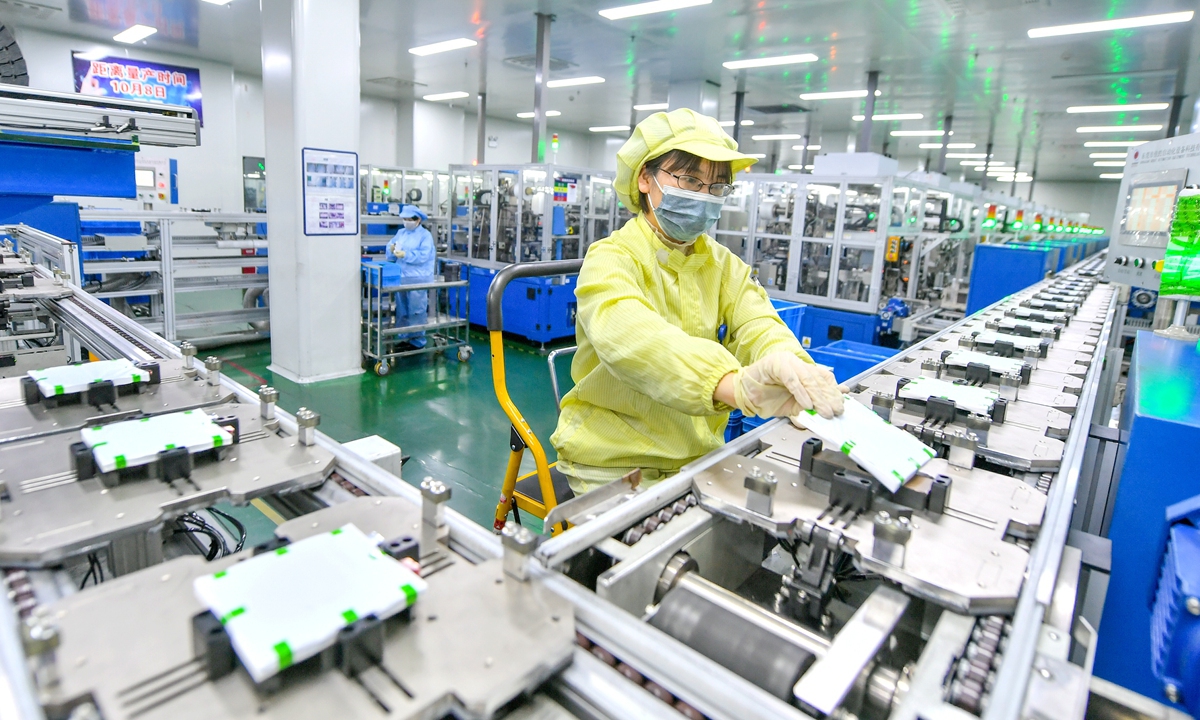
A worker at a lithium battery factory in Huzhou, East China's Zhejiang Province Photo: cnsphoto
China's investment in Europe fell to a 10-year low last year, a new report showed. Experts said the EU's increasing scrutiny of Chinese investment makes Chinese investors more cautious, and they urged the EU to mend ties with China to boost bilateral cooperation in sectors, such as the green economy and the digital economy, to rev up the gloomy European economy.
Chinese foreign direct investment (FDI) in Europe was 7.9 billion euros ($8.68 billion) in 2022, down 22 percent year-on-year, according to the report jointly released by US research provider Rhodium Group and European research institute MERICS on Tuesday.
The drop took Chinese investment back to its 2013 level, mainly due to scarce Chinese merger and acquisition activities, the report showed. It noted that only Tencent's purchase of British video game developer Sumo Digital exceeded 1 billion euros.
"A major reason for the drop is that the EU has been tightening scrutiny of Chinese investment and setting barriers on normal business cooperation, as the bloc stretches so-called security concerns," Yang Chengyu, an assistant research fellow at the Institute of European Studies of the Chinese Academy of Social Sciences, told the Global Times on Tuesday.
Amid the mounting US pressure for "decoupling" from China, some EU politicians have hyped reducing economic dependence on China and weaning the region off Chinese technologies and raw materials, having a negative impact on bilateral trade and investment, Bian Yongzu, a senior industry research fellow and visiting scholar at Yale University, told the Global Times on Tuesday.
Bian said that sluggish economic growth and financial tightening in Europe have also affected foreign investors' confidence.
However, Europe has become a key region for China's electric vehicle investment. Driven by electric vehicle battery factories, Chinese greenfield investment in Europe overtook M&A transactions for the first time in 20 years, reaching 4.5 billion euros, or 57 percent of the total, according to the Rhodium-MERICS report.
"Greenfield investment is a type of foreign direct investment where a company sets up factories in a country, which will directly contribute to the local economy by creating jobs and driving up production capacity," Yang said.
He said that the EU prefers this type of Chinese investment, because the bloc has sought a green energy transition since the start of the Russia-Ukraine conflict, and it's a sector in which Chinese enterprises could provide excellent products.
The increase in greenfield investment was driven mainly by a few large-scale projects, concentrated in the automotive sector as Chinese battery giants - including CATL, Envision AESC and SVOLT - invested in building battery plants in Germany, Hungary, the UK and France, according to the report.
China's new-energy sector has developed rapidly over recent years. While its installed capacity of renewable energy sources, such as solar and wind power, leads the world, its production and sales of electric vehicles account for about half of the world's total, Bian said.
"Along with the recovery of the Chinese economy, its outbound foreign direct investment will continue to grow. However, expert maintains a wait-and-see attitude on the growth prospect of China's investment in Europe, as China-EU relations may not be mended in the short term, given the impact of the US' anti-China policies and pressure on the EU.
He said that China may increase investment in friendly countries this year, for example those in Southeast Asia and the Middle East.
China's non-financial outbound direct investment rose 26.3 percent year-on-year to 215.97 billion yuan ($31.19 billion) in the first quarter, official data showed.
Investment demand between China and the EU remains strong, especially in the energy transition and green development, digital economy and trade, experts said, calling for close bilateral ties.
"Chinese investment is an opportunity for Europe, as more investment from other foreign countries will remarkably stimulate Europe's economy," Bian said.




